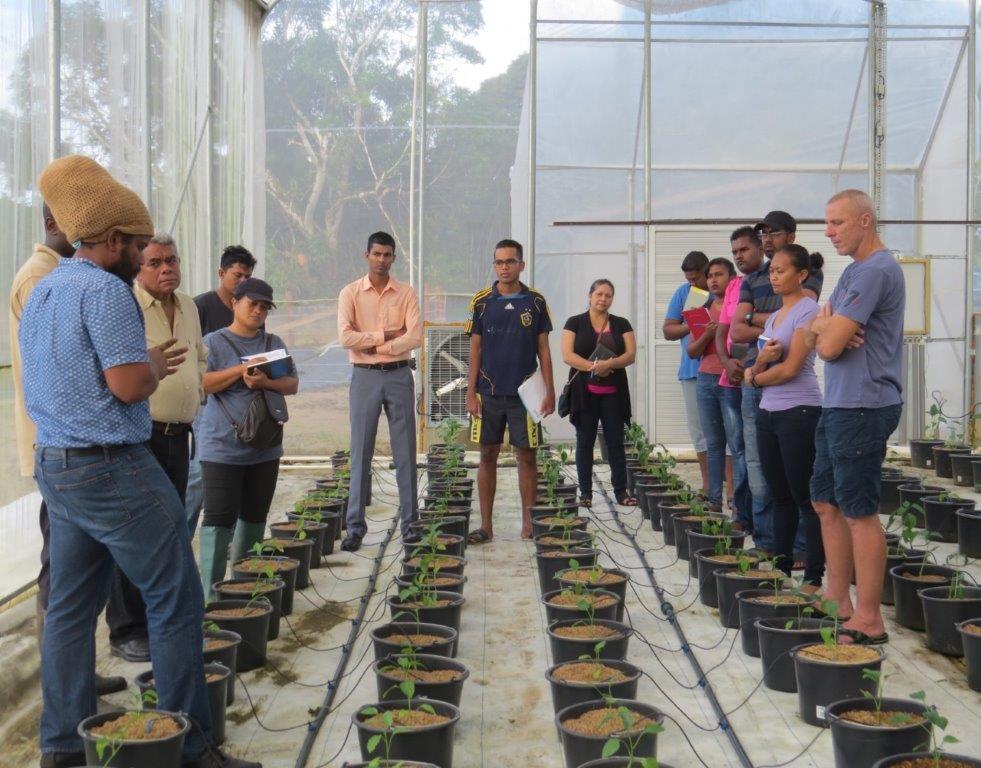Horticultural farmers and agricultural technicians in Suriname strengthen their knowledge and skills in climate smart technologies to assist them in building resilience to the negative impacts of climate change.

Paramaribo, August, 2018 (IICA). Horticultural farmers in the vegetable production belt of Weg naar Zee, in the coastal area of Suriname, were this week in receipt of two fully automated protected agriculture structures, and micro-irrigation systems with rain water harvesting infrastructure. The main beneficiary farmers are members of the Producer Organization, Vereniging Duurzame Ontwikkeling Weg naar Zee, with a membership of 40 active farmers who produce a wide range of vegetables crops on the low lying coastal plains on the outskirts of the city of Paramaribo and are the main suppliers to marketing outlets to the city.
The donation of the two fully automated protected agriculture structures and two micro-irrigation systems along with rainwater harvesting infrastructure, is in keeping with the objective of supporting the efforts of Suriname in adapting their agricultural sector to mitigate and/or build resilience to the negative impacts of climate change such as salt water intrusion from rising sea level, extended drought and extreme rainfall events which have ravaged agriculture production and farmers livelihoods in the coastal zone over the past two decades. The protected agriculture structures provides 810m² of production space and are fully equipped with cooling and fertigation systems for hydroponic production of vegetable crops, as well a rain water harvesting system with a reservoir of 480m³ capacity. The energy for operating protected agriculture structures is provided by a combination of a 16 KW Solar Energy System for daytime use and connection to the national electric grid. The system is designed that energy used from the national grid at night is zeroed during the daytime from the solar unit resulting a net zero carbon emission. In addition any excess energy produced and supplied to the national grid benefits the country as a whole.
The micro-irrigation systems included a 2000m² drip irrigation system for row vegetable crops, and a 4000m² micro-sprinkler system for leafy vegetable crops, each complete with a fertigation system and a 480m³ capacity reservoir. These deliverables were installed as demonstration units to facilitate the training of horticulture farmers, agricultural technicians and tertiary level agriculture students in the production of vegetables under controlled environments, and the open field management and production of crops with more efficient irrigation technologies, which is particularly important for periods of extended droughts and for the farmers affected by salt water intrusion who can no longer utilize the traditional ground water sources for irrigation. In addition to the series of training interventions facilitated by IICA, a select group of vegetable farmers and technical specialists also benefited from a 10-day training course in protected agriculture from the Regional Centre for Integrated Services in Protected Agriculture (CRESIAP), in Guadalajara, Mexico. Over 140 secondary school students were also sensitized to the threats posed by climate change and the climate smart technologies which can help adapt to and mitigate its negative impacts, through a series of field visits and classroom lectures.
These climate smart technologies and training programmes were financed by the European Union through the Global Climate Change Alliance + (GCCA+) initiative, which is managed by the United Nations Development Programme (UNDP). IICA is the Executing Agency for the project financed under the above-mentioned facility in Suriname entitled: Reducing Farmer Vulnerability to Climate Change Impacts through the Promotion of Climate Smart Agricultural Technologies in Suriname. The project was supported by the Ministry of Agriculture, Animal Husbandry and Fisheries of Suriname.
A large number of public and private sector agriculture and development agencies, international organizations, embassies and residents of the Weg naar Zee communities including national and local community leaders came out to partake in and witness the handover ceremony, which was carried out by the IICA Delegation and the UNDP Office in Suriname and the Producer Organization- Vereniging Duurzame Ontwikkeling Weg naar Zee. At the ceremony, the IICA Representative in Suriname reiterated “IICA’s commitment to the full spirit of collaboration in addressing agricultural and rural developmental challenges to the extent that under IICA’s new Director General, the Sustainable Development Goals (SDGs) of the United Nations has been prioritized as a specific guiding principle for which the Institute is fully committed to achieving, and IICA’s strategic objectives are now fully aligned with the SDGs.” The Minister of Agriculture, his Excellency, Mr. Lekhram Soerdjan, advised farmers “to take special care and pay attention to the types of technology that they aim to invest in for their farms in these times, and they should ensure that any investment in agricultural technology right now, needs to be climate smart or it may not be profitable or particularly useful to them in the advent of climate change impacts.” The Deputy Resident Representative of UNDP in Suriname, Mr. Armstrong Alexis, emphasized “the importance of interventions of this type for the UNDP because they embrace and respond to multiple SDGs simultaneously, such as, climate action, no poverty, zero hunger, affordable energy, sustainable cities and communities, decent work and economic growth and partnerships for goals.”
The projects is scheduled to officially end in November 2018. IICA is also promoting and actively working on complimentary interventions in Suriname such as permapiculture for income generation and mangrove forest restoration and sustainable crop intensification systems for indigenous communities to reduce slash and burn agriculture and enhance food and nutrition security.










